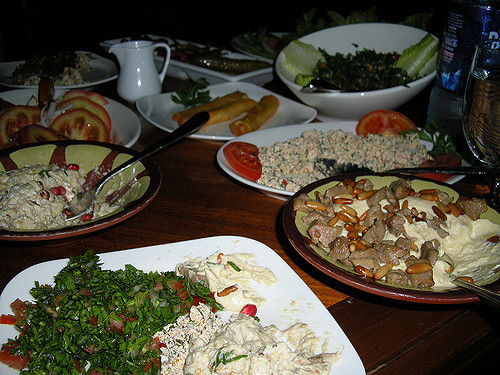Updated
A View From the Opposite Ends of the Arab World — Ambassador Edward M. Gabriel (ret.)

Lebanese mezze Photo: k8o
Ambassador Edward M. Gabriel (ret.)
June 15, 2018
 Having made dozens of trips in the past two decades to Morocco and Lebanon, I can’t help but compare these two Arab countries and see the striking differences, as well as the surprising similarities between them.
Having made dozens of trips in the past two decades to Morocco and Lebanon, I can’t help but compare these two Arab countries and see the striking differences, as well as the surprising similarities between them.
As an American of Lebanese heritage, I took my first trip to Lebanon in 1994, which was the first time anyone on my father’s side had travelled there in 85 years, and more than 100 years on my mother’s side. It was a place I would visit dozens of times thereafter, both for work and pleasure.
I visited Morocco for the first time in 1996 for a weekend with my wife, not knowing that less than two years later, I would be living there as the US Ambassador. My ties with Morocco would continue after my tenure, as adviser to Morocco for over 15 more years.
The most striking similarity between the two peoples is their outward sense of hospitality. I can’t think of a more extroverted, outgoing people than the Lebanese and Moroccans. Before your visit ends, a complete stranger will have invited you to their home for dinner and made sure you knew you always had a place to come back to.
Both countries emphasize their tolerance of religion and diverse cultures. The Moroccans cannot define themselves without explaining the contribution of Judaism to their history and the importance of Jews in their development as a nation. King Mohammed VI has refurbished Jewish cemeteries, synagogues and Jewish historical sites. He referred to the Holocaust as “one of the most tragic chapters in modern history,” adding that “amnesia has no bearing on my perception of the Holocaust, or on that of my people.”
The Lebanese will tell you that in no other place on earth do Christians, Sunnis, Shiites, Druze, and more than a dozen other religions live side by side, sharing power in governing their country. In Lebanon the President must be Maronite Catholic, the Prime Minister Sunni, and the Speaker of the Parliament Shiite. Churches and synagogues sit side by side, with the Muslim call to prayer and bells ringing for Mass sometimes occurring at the same time.
And it is impossible to choose whose nightlife is more open and daring! No other place in the Middle East can compare, and this serves as a reminder of their resistance against conservative religious extremism.
And both countries sit on different corners of the Arab world, touched in large part by Europe, mostly France historically. Importantly, they care a great deal about their relationship with the United States, and cooperate closely on military, security, and development issues.
Don’t get into a discussion about whose cuisine is better. It’s a losing battle, and on this note it’s a tie in my opinion. Whether it’s a lamb and date tagine, Friday couscous or seafood pastilla, ending with fresh fruit from a Berber village; or baked baba ganoush, kibbe, falafel, and tabbouleh, ending with homemade baklava, there is no way I can pick the winner. And neither side will give ground on this score.
The Lebanese have a contagious smile and a sense of goodness and humor that is displayed by them in every country of the world. Almost everywhere you go, someone will tell you that their life was touched by a Lebanese.
The Moroccans are a kind, inquisitive and generous people. They have a gift of caring that defines their obligation to always help others, and a sense of obligation to give back to their community and country, and both countries are known for their charitable support of civil society programs.
The Lebanese, descendants of the ancient Phoenicians who roamed the Mediterranean, are very entrepreneurial and outwardly focused, counting amongst them the most successful people in the world in business, academia, science, technology, and politics. They are increasingly Ameriphile, born risk-takers, and among the most successful entrepreneurs on the planet. They don’t take orders well and are focused first and foremost on their family and religion. Country is further down their list. However, internally, the Lebanese struggle to run an efficient government. Although the Lebanese banking industry and Lebanese Armed Forces are lauded for their professionalism and competence, they struggle in carrying out other responsibilities, such as disarming competing militias and cooperating politically with one another to find common ground, thus living in constant turmoil and on the edge of violence.
The per capita income of the Moroccans is less than half that of the Lebanese; they are more Francophile, and have a small middle class which creates a noticeable wealth difference. Moroccans avoid taking risks for fear of failure, are an inward looking people, and extremely nationalistic. Their King and country come first, in that order. The three kings since Moroccan independence have earned this loyalty and love, as they led their citizens through numerous threats and challenges.
Even with their economic disadvantages, Moroccans are progressive on women’s rights, have a superior infrastructure development plan, and have had very successful parliamentary elections and smooth transitions of government. They have secure borders, successfully protect the safety of their citizens, are instituting progressive reforms in energy, prison and judicial reform, and making significant progress in human rights and weeding out corruption.
Overall, what’s most amazing about both countries however is how clearly they stand out in a region of little hope and too much despair. There is something about Lebanon and Morocco that happens when you step into these countries. You sense a hope and belief that tomorrow will be better. You get an upbeat feeling as though East will meet West and the best of the two will flourish in the future. You feel a friendship and love for America, and a desire to become close friends. You leave wanting to return as soon as possible because you want to put that big smile on your face as soon as you land again, to see those new friends who are now waiting for you to come back home. It’s contagious. Come see for yourself.